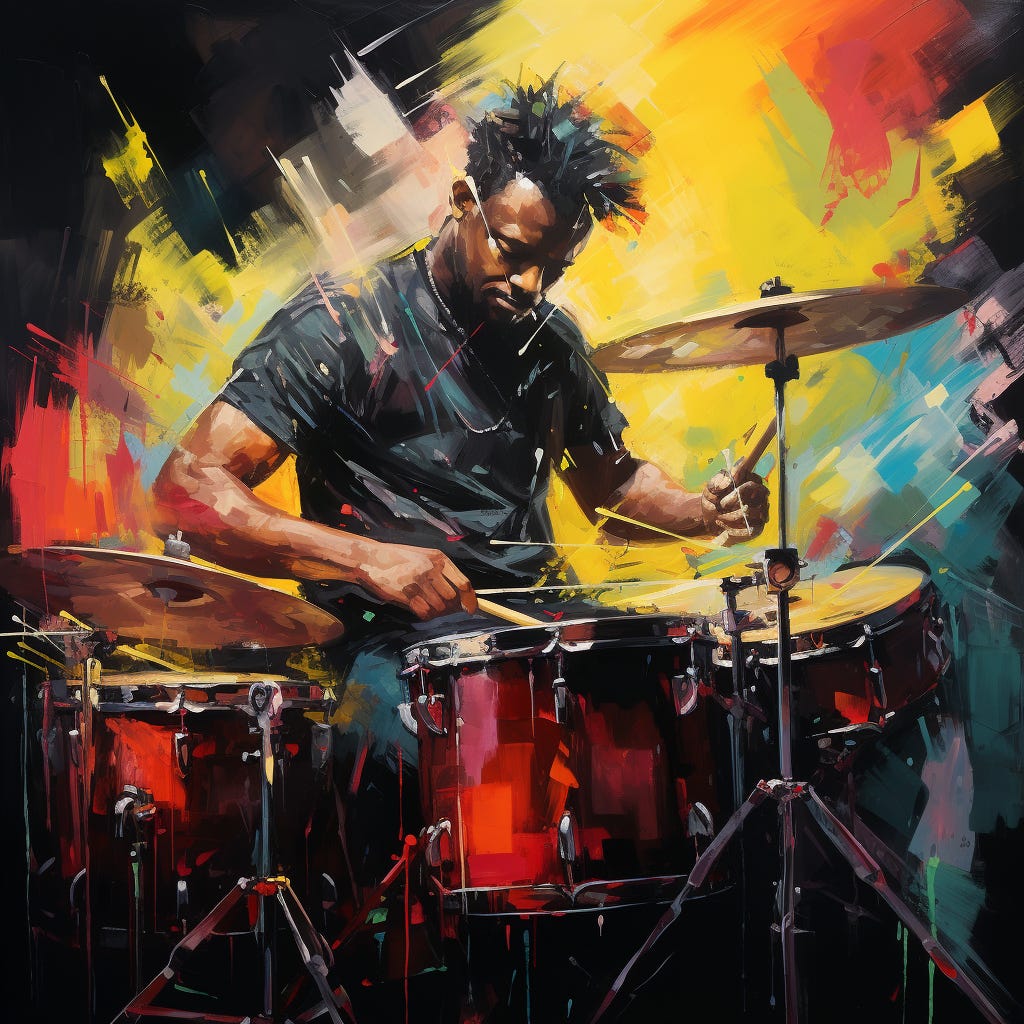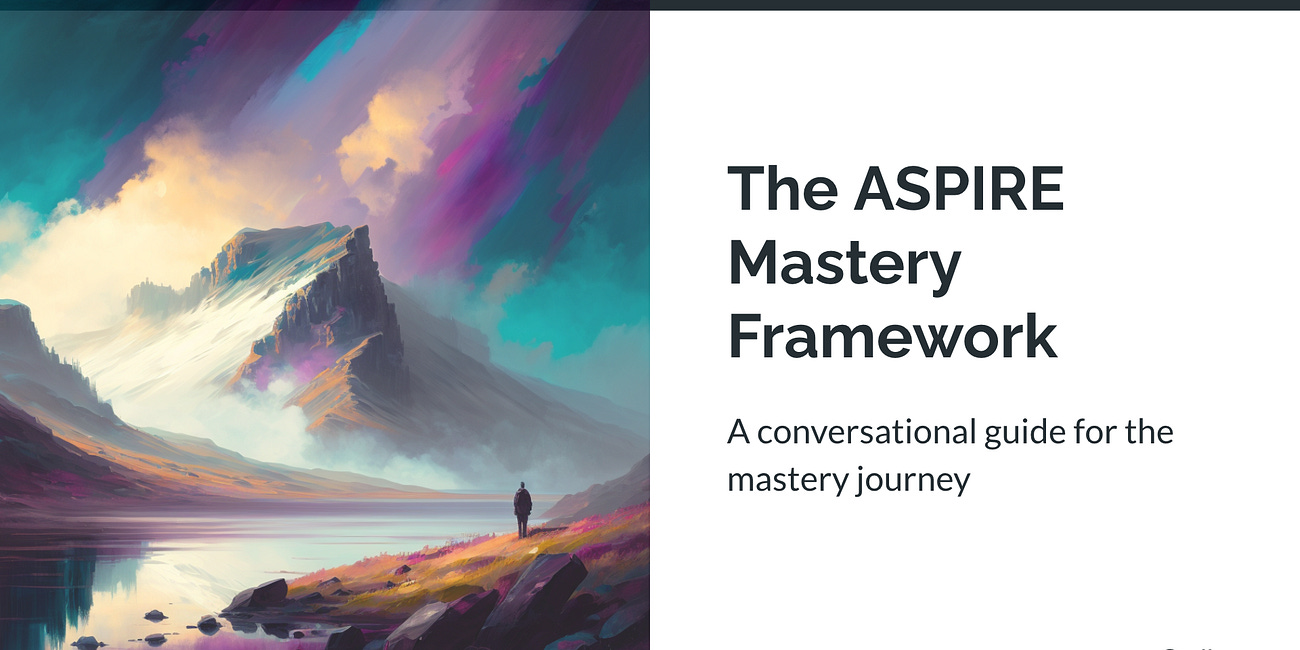The Reward of Tiny Breakthroughs
Life would be unsatisfying if progress was linear
Bravo! I’ve just taken another tiny leap forward in my drum practice. It’s the kind of breakthrough you get in any endeavour that depends on intentional persistence after a long time of feeling like you’re getting nowhere.
Playing and practising musical instruments provides a useful window into the mechanics of learning. The frustrating effort of focusing the mind on controlling one’s fingers according to rhythms and harmonies that live in our head, and persisting with it despite sounding awful. The countless hours wasted, where it feels like you’re making no progress at all. Repetition after repetition. Forcing yourself to try again. Making variations, trying different approaches, slowing it down, speeding it up, breaking it down to its core rudiments. But still, the excruciating sounds you’re producing are rousing the dogs next door into howls of disapproval.
Then… Something clicks. You get a portion of the piece right. Just once, but you heard it. It didn’t sound like you, it sounded like someone who knows what they’re supposed to be doing. Maybe you can nail it after all, with just a little more practice.
But, your progress backslides. Maybe you’re not good enough, maybe your aspiration to be a musician was foolhardy. Distracted, you start scrolling through the countless music tutorial videos on YouTube and the flawless renditions of virtuosos who barely look old enough to be served alcohol in a bar. How did they get so good? Natural talent? The envy eats you from the inside and your commitment to your instrument wanes.
And that’s why musical instruments are such a good laboratory for gaining insight into the human learning process. The struggles, the setbacks, and the frustrations are experienced by all learners in any domain. It’s just that with music, the feedback is instant. The wrong notes and out-of-step rhythms are felt instantly to the core of your body because the process of learning an instrument is one of deep immersion. The coordination of the mind and body, or lack thereof. A duff note to a musician is like a punch on the nose to a boxer. It’s visceral. It hurts.
But then there are the real breakthroughs when suddenly, out of nowhere, it all seems to click. I had one of those yesterday on the drumkit. I never saw myself as a drummer so didn’t have any expectations when I started as an adult to learn a few of the basics. I’d been in bands as a guitarist and when I’d made eye contact with the other players, a useful practice when you’re winging it together, it was always the drummer whose eyes seemed to contain a sparkle. Relaxed, you can’t be an uptight drummer, they often were the ones who seemed to be in their own zone, enjoying the groove, leading the cadence of the whole band. It looked such fun. Up until last year, I’ve only dabbled. But now, in my soundproofed garden studio, I can bish, bash, bosh on the kit to my heart’s content, and have been a little more purposeful in my practice.
A drummer whose style I’ve particularly admired is Donald “DJ” Johnson who sits in the engine room of the difficult-to-pronounce band, Khruangbin. His understated metronomic grooves drive the difficult-to-categorise sounds emanating from the guitar and bass. He holds back on any fancy flourishes and drum fills on a stripped-down kit. Keeping time with a gentle head nodding, his quiet playing speaks volumes. Keeping his ego in check and with the most subtle of touches he addresses the drums with a gentle caress, as opposed to beating the crap out of the skins that we often associate with drummers. But don’t be fooled by the simplicity, it’s all in the breakbeat-influenced feel, far harder to replicate than you would imagine.
I’ve been practising their song ‘August 10’ on and off for the last year. Concentrating on the even-paced 16th notes of the hi-hat, trying to use the natural bounce of the drumstick to achieve the same dynamics as DJ Johnson. My progress has been so slow. I can hold the groove at slower beats but as soon as I get anywhere near to tempo, I stiffen up and lose it. Drumming is all about relaxing. You can’t play laid-back grooves like this by forcing it.
But yesterday I had a breakthrough, I can finally sustain the beat at tempo. I wouldn’t say I’ve nailed it as I’m nowhere near the Zen-like meditative state that DJ Johnson seems to effortlessly achieve, but something has happened to unlock it for me. The funny thing is, I don’t think I’ve tried this piece for the last couple of months, but I’ve been exploring other pieces, purposefully and persistently. So something has become ingrained through habitual practice that has released my potential. I’m not having to consciously think about my hi-hat bounces, it’s all starting to flow and my forearm isn’t tensing up. As I’m playing I see new possibilities opening up before me as my sticks and feet add in other little experimental beats. Another tiny step forward which has left me with a satisfying grin that melts away the struggles of the previous year. I have yet to attain the aforementioned ‘sparkle in the eye’ of the drummers I’ve played with previously, but maybe one day.
This is why practising instruments gives one such a useful attitude to take on the path of mastery in other pursuits, and perhaps life in general. This is the hard work and reward of learning. The longer and harder the suffering, the greater the eventual reward. In our anti-mastery world of quick fixes, hacks and stimulation on demand, learning music offers a valuable experiential reference for what is involved in getting better at things.
“Don’t quit one day before the miracle happens”
Musician, Kenny Werner, in a YouTube interview.
Now with a sense of liberation, and with a new skill locked into my neurology, I’m enthused to move on to the next challenge, the next long struggle before a future breakthrough. Our thirst for improvement is only momentarily quenched as we move on to the next plateau and wait however long it takes for the next iterative spurt of improvement.
Our ego tells us to quit, that we’re wasting our time, but persistence provides evidence to the contrary. Learning an instrument is experiential learning about learning. Thank you Donald “DJ” Johnson for the inspiration.
If you are a drummer or any other kind of musician who wants to be more dedicated to learning your instrument, or just an ordinary person who is interested in applying the principles of mastery to your life or career, then you may wish to attend the first online Ordinary Masterclasses in early 2024. See the details in the linked article below.
Ordinary Masterclasses
This announcement is something I’ve been musing about since starting this blog and registering the OrdinaryMastery.com domain. It is a leap of faith in the spirit of the fool. I intend to launch a programme of online modules for ‘ordinary’ people pursuing a path of mastery in their lives.





Great piece, John. I'm a little envious of your being able to bash a drum kit whenever you feel like it. You're right about the incremental progress. I think we have to lean into the process. Music as a kind of meditative practice. And thanks for pointing me to Khruangbin. I enjoyed their vibe.
Interesting resonance with my waking thoughts. I found myself thinking about regeneration, and the role of exhaustion. When soul is depleted we can’t “nourish” it by additions of articulation nutrients, we just have to leave it alone. Lying fallow is technique as old as time, and yet our love of analysis and systems won’t let us.
I’m intrigued by the metaphor of leaving your drumming alone for a while, and then your inner rhythm appearing unbidden. Much we can learn from that perhaps.